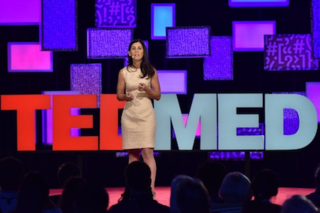Sexual Abuse
Child Sexual Abuse Prevention Goes to TEDMED
What was said about child sexual abuse prevention at the 2016 TEDMED conference.
Posted January 20, 2017

Last year culminated in a once in a lifetime opportunity—the chance to give a TEDMED talk to a curated, attentive and influential audience about child sexual abuse prevention. TEDMED is the independently owned and operated health and medicine edition of the world-famous TED conference. This annual event is dedicated to “ideas worth spreading.”
The theme for 2016 was “What if…?” and speakers were asked to imagine new possibilities for advancement in medicine, public health and biomedical sciences.
I asked the question: what if we stopped treating child sexual abuse as solely a criminal justice problem and instead treated it as the preventable public health problem that it is?
In my talk, I told the story of the fateful day I met with the journalist who would break the story about non-offending pedophiles and my research in finding a public health approach to ending child sexual abuse. Luke Malone brought the idea of child sexual abuse prevention into the living rooms of millions of Americans who listened to his story on This American Life.
I also discussed some important statistics that everyone should know. The peak age for engaging a prepubescent child in harmful or illegal sexual behavior is 14, and about half of all sexual offences against prepubescent children are committed by other children.
Another important statistic is that nearly 98 percent of children convicted of a sexual offense are never reconvicted of a new sexual offence. This shows that adolescent sexual offending is short-lived and it strongly suggests that we can prevent the first offence.
And yet, instead of focusing on prevention, we put most of our efforts on punishment.
Children who are caught engaging in harmful sexual acts might receive treatment instead of prosecution, which acknowledges that children, even those who make serious mistakes, have the potential to be rehabilitated.
For the children who get caught, prosecuted and convicted of sex crimes, they are often treated like adults. They can face incarceration and sex offender registration and public notification, sometimes for life. Registered children can be prohibited from living near schools, parks and playgrounds—the very places where our children thrive.
And what do we make of the people who discover in adolescence that they have an unwanted attraction to prepubescent children? Our interviews with 30 young adults living with an unwanted attraction to children revealed just how hard it is to find help and cope with their attractions. Many reported that they felt isolated, depressed and even contemplated suicide. Many said that what they truly needed (and could not find) was help in dealing with the shame and stigma that can accompany these attractions.
As part of the TEDMED talk, I presented quotes from these interviews to provide the audience with a better understanding of non-offending pedophiles. (Luke Malone also moderated a panel discussion on non-offending pedophiles that was held in 2015). For children dealing with an unwanted attraction to prepubescent children, acting out might not be the only issue. Some will need our help to resist acting on strong urges some of the time.
So what needs to happen now?
We must start thinking about child sexual abuse as a preventable public health problem. This includes providing all children access to effective prevention programs that focus both on avoiding harm and on attaining health and happiness.
Good programs will teach children how to behave responsibly around younger children; they will encourage children to disclose attractions to others when it is safe to do so and they will inspire all of us to respond to those disclosures with understanding and compassion.
I’ve had positive feedback about the talk so far. A reporter from the Huffington Post called it “one of the boldest” TEDMED talks for that year.
I anticipate that TEDMED will release a publicly accessible link to my talk (and others). But for now, I’ll continue to look for opportunities to bring the idea of child sexual abuse prevention to as many diverse audiences as possible.


